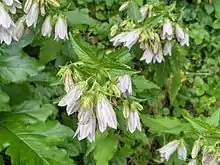| Korean bellflower | |
|---|---|
 | |
| Scientific classification | |
| Kingdom: | Plantae |
| Clade: | Tracheophytes |
| Clade: | Angiosperms |
| Clade: | Eudicots |
| Clade: | Asterids |
| Order: | Asterales |
| Family: | Campanulaceae |
| Genus: | Campanula |
| Species: | C. takesimana |
| Binomial name | |
| Campanula takesimana Nakai | |
Campanula takesimana (Korean bellflower, Korean: 섬초롱꽃, seomchorongkkot) is a species of bellflower.[1] It bears pink to white flowers. There are several cultivars available for the home gardener.
Takesimana is seen as a less invasive alternative to Campanula punctata, its close relation.[2] They are similar in appearance, though the flower shape of takesimana can appear more flared. Both range in colour from white to pink.
The Korean herbal root, doraji (Korean: 도라지), does not come from this plant, but rather from the Chinese bellflower (Platycodon grandiflorus), although do-ra-ji is usually translated from Korean as "bellflower".
References
- ↑ "World checklist of selected plant families". Royal Botanic Gardens, Kew. Retrieved 12 June 2021.
- ↑ "Campanula takesimana 'Elizabeth'". Missouri Botanical Garden - Plant Finder. Retrieved 12 June 2021.
This article is issued from Wikipedia. The text is licensed under Creative Commons - Attribution - Sharealike. Additional terms may apply for the media files.